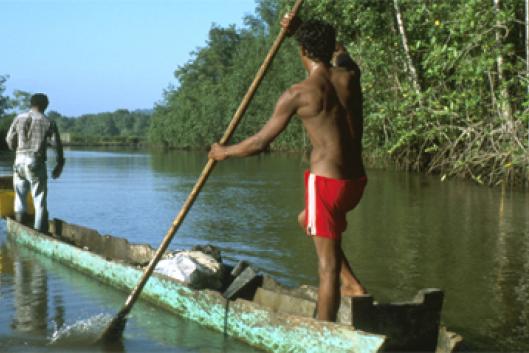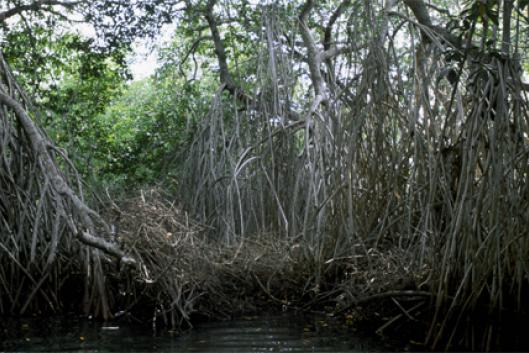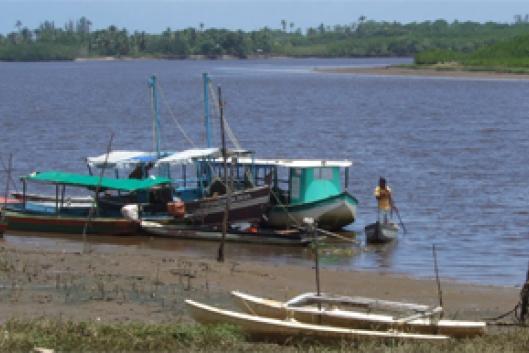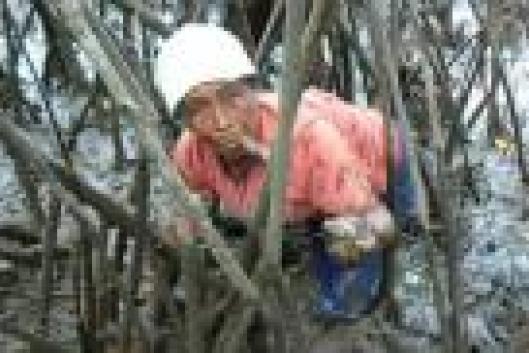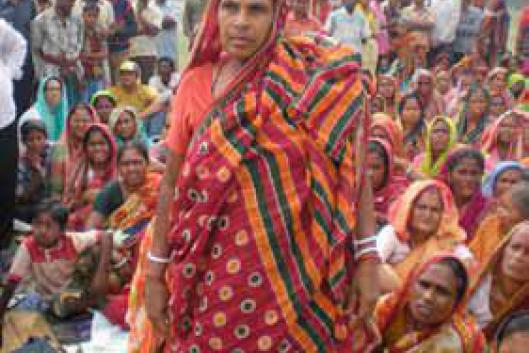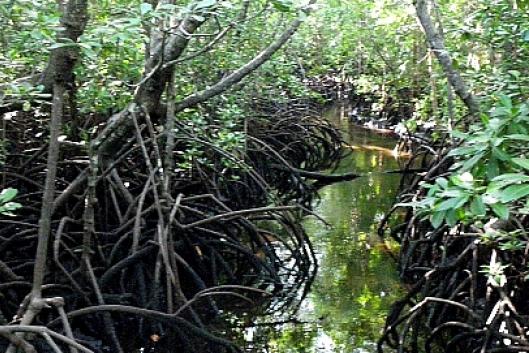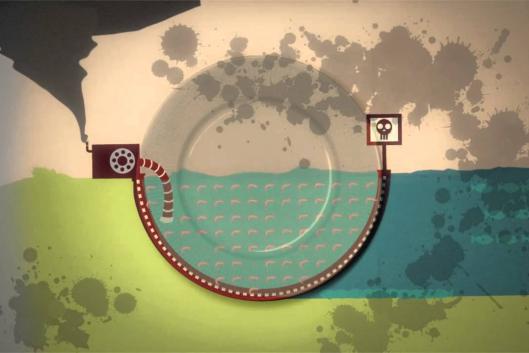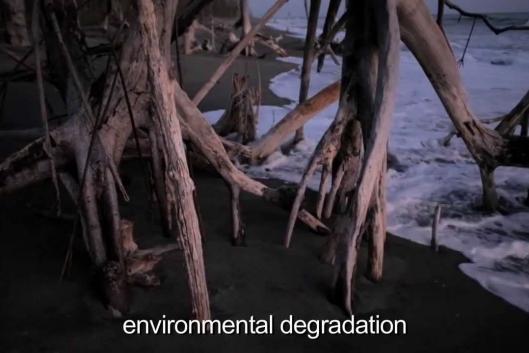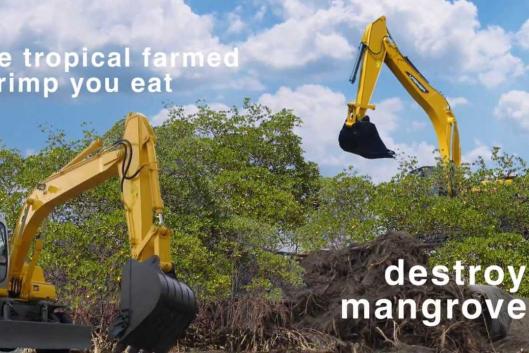(Photo: Greenpeace International)
Mangroves, which are a type of forest, could be considered the most forgotten or invisible tropical forests on the planet. And their inhabitants, in turn, could be the most forgotten or invisible of the communities who directly depend on forests for their survival.
Bulletin Issue 192 – July 2013
Mangroves
WRM Bulletin
192
July 2013
OUR VIEWPOINT
THE FOCUS OF THIS BULLETIN: MANGROVES
-
30 July 2013In June 2013, delegates from Brazil, Cuba, Mexico, El Salvador, Honduras, Peru, Venezuela and Guatemala joined together in Monterrico, Guatemala for the 6th Meeting of the Board of Directors of Redmanglar Internacional for the Defence of Marine Coastal Territories and Community Life.
-
30 July 2013The community of Isla Chicales, located in the municipality of Nueva Concepción in the department of Escuintla, is made up of 140 families who benefit directly and indirectly from fishing and other activities in the mangrove ecosystem where they live. Several years ago, when they observed signs of the degradation of the ecosystem, they undertook action and measures for its conservation, including community-based regulation of fishing and hunting, and reforestation in the degraded areas of the mangrove forest.
-
30 July 2013Brazil’s coasts are seriously threatened by a range of large-scale projects. The privatization of waterbodies, concessions over public waters for free to big consumers, and installation of fish farms are some of the activities that are endangering the mangroves and the livelihoods of local communities.
-
30 July 2013(Photo: C-Condem) The décima is a poetic form that has been used for many years as a tool of protest by Afro-Ecuadorians, who keep this cultural traditional alive while denouncing the trampling of their rights by greedy and powerful interests like the shrimp farming industry and others that are destroying the mangroves. Linver Nazareno dedicates this décima to the women who live in the mangroves, as a tribute to the hard work they endure every day. Mangrove Woman by Linver Nazareno
-
30 July 2013The shrimp industry has boomed over the last 20 years as the result of production on large industrial shrimp farms, which have devastating impacts on mangroves as well as causing countless human rights violations against the people who live in and depend on these ecosystems. The Swedish Society for Nature Conservation (SSNC) launched the Anti-Scampi campaign (scampi is a term used to refer to large shrimp or prawns) in 2011 with the goal of influencing a change in the consumption of shrimp in Sweden.
-
30 July 2013According to The World's Mangroves 1980-2005 (FAO 2007), Indonesia has the largest mangrove area in the world in terms of the extent of the region. However, the condition of mangroves has declined both in quality and quantity from year to year. In 1982, Indonesia's mangrove forests covered an area of 4,25 million ha, while in 2009 it was estimated to be less than 1,9 million ha (KIARA, 2010). For example, according to the “Status of Environment in Indonesia 2009”, issued by the Ministry of Environment, "The mangrove forests in North Sumatra covered 306,154.20 ha, 9.86% of which was in poor condition".
-
30 July 2013(Photo: SSNC) The negative patterns of land grabbing and intimidation recorded by a Swedish Society for Nature Conservation (SSNC) investigating team in shrimp farming areas around Khulna, Bangladesh clearly affect entire families whose lands and livelihoods have been destroyed. However, the Bangladeshi civil society organization Nijera Kori and experts in the field of women’s rights maintain that the spread of shrimp aquaculture ponds in the vicinity of Khulna has had a particularly negative impact on women.
-
30 July 2013The land grabbing effect of conservation projects is rarely considered in the current discussion of global ‘land grabbing’. In Tanzania, where around 40 % of the land area of the country is under some form of environmental protection, conservation areas have steadily increased since colonial times, leading to loss of land and access for small‐scale farmers, pastoralists and fisherfolk.
PEOPLES IN ACTION
-
30 July 2013The Martín Pescador Centre, devoted to the marketing of products and the revaluation of the culture of the ancestral peoples of the mangrove ecosystem, is an initiative of the National Coordinating Committee for the Defence of the Mangrove Ecosystems (C CONDEM), comprising the people’s organizations that make up C CONDEM: grassroots organizations, fronts, federations and unions of communities devoted to artisanal fishing and gathering of products from the mangroves.
-
30 July 2013Mangroves, food sovereignty for coastal communities was the theme chosen this year for the International Day for the Defence of Mangrove Ecosystems (July 26) by Redmanglar International, which organized a variety of activities in Latin America between July 16 and July 26 to mark the occasion. During these days, representatives of various organizations joined with local communities to carry out mangrove reforestation work and to gather mangrove tree seeds . Other activities included press conferences, radio shows, video screenings, and fora on the situation of mangroves in Jiquilisco Bay.
-
30 July 2013The People’s Coalition for Fisheries Justice Indonesia (KIARA) celebrated the World Mangrove Day issuing a press release where it “urged the government to immediately conduct a revocation of the business license and or development projects (oil palm plantations, shrimp farms, coastal reclamation, and so on) that causes the loss of mangrove forests. The government should also prioritize its support to initiatives in rehabilitating mangrove fishing communities, including in Langkat and Serdang (North Sumatra) and East Lombok, West Nusa Tenggara, rather than busy doing ceremonial activities in response to the increasingly widespread practice of mangrove forest destruction in Indonesia.
RECOMMENDED
-
30 July 2013“Keep tiger prawns off your plate" - video of SSNC campaign, at
-
30 July 2013“Yo vivo en el bosque del manglar” - video by CESTA / Amigos de la Tierra El Salvador, available at (in Spanish with English subtitles)
-
30 July 2013Motion video - by Carly Hoover, MAP's featured artist to celebrate July 26 Mangrove Action Day, at http://player.vimeo.com/video/19264147 (only in English)
-
30 July 2013“Llora el Manglar”- by Leandro Velasco y PROYDE, ASPA y AZACÁN SERSO Castilla y León http://www.cultureunplugged.com/documentary/watch-online/play/12853/Llora-el-manglar (in Spanish with English subtitles)
-
30 July 2013“Question your Shrimp” - Mangrove Action Proyect (MAP), at http://www.youtube.com/watch?v=_KVJbUHGAQg#at=15
